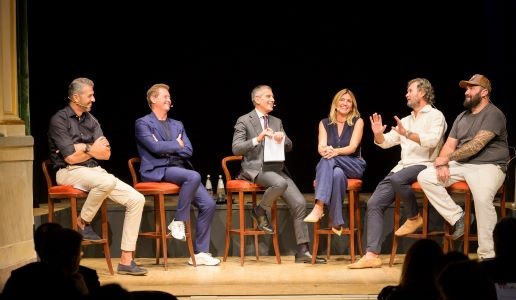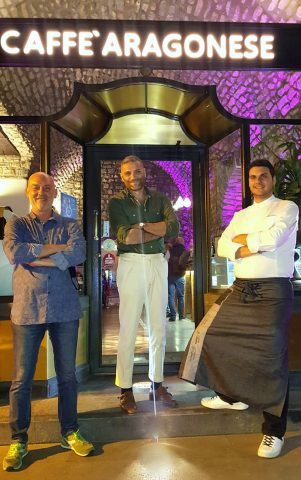Earth, the roots of culture

Have you ever tried to trace the essence of the word "culture"? The etymology leaves no room for doubt: "culture," in Latin, means "cultivation of the earth" and is derived from the verb còlere, "to cultivate." And while today this term has evolved and has a broader meaning, encompassing various fields, its derivation stems from the earth itself. Like the food we consume every day.
That's why, on the occasion of the rich schedule of events for Bergamo Brescia 2023 Italian Capital of Culture - for the first time assigned to two Italian cities, both with an important wine and food tradition - the Franciacorta Consortium, Destination Partner of the MICHELIN Italy Guide for the past three years, wanted to launch a debate precisely on the importance of food and wine as key elements of Italian culture, rooted in the territory - and the land - and expressing its ideals, identity and lifestyles.
The talk "Terra, the roots of culture," which took place today, was attended by star chefs and leading figures in the cultural and food and wine fields.
Among them were chefs Enrico Bartolini, Andrea Berton, Enrico Cerea, Stefano Cerveni, Carlo Cracco, Davide Oldani, Nadia Santini and Riccardo Scalvinoni. Also with them were Silvano Brescianini, president of Consorzio Franciacorta, Marco Do, Michelin's communications director, Maddalena Fossati, editor of La Cucina Italiana, Chiara Maci, blogger, Edoardo Monti, patron and founder of Palazzo Monti, and Matteo Zoppas, president of ICE.
As President Silvano Brescianini pointed out, "we Italians are so addicted to the beauty, both historical and cultural, of our country that we often don't know how to value it: we all grew up with "good" things, and knowing and appreciating our culture leads us to create products that are recognized and rewarded all over the world, enhancing Italian cuisine even more."
For Matteo Zoppas, "since always, being Italian and spreading "Made in Italy" abroad means bringing with you the taste, passion and culinary tradition of a land rich in history and extraordinary flavors. This implies embodying unparalleled excellence in food and wine, a luster that the world recognizes us every day."
Maddalena Fossati showed all the pride - and hope - related to the candidacy of Italian cuisine as a UNESCO World Heritage Site: "We have done the hardest part. Now it's about working together following the same narrative and identifying a common concept of Italian cuisine. And I feel that we will succeed."
Building on a tradition that is now centuries old, Marco Do modestly specified that the Michelin Guide - far from wanting to be a "bible," as it is often called - is, however, "a truly reliable guide for travelers, who not only eat in the reported restaurants but also sleep, visit places and create induced income for the whole territory."
Turning to the chefs present at the debate, Davide Oldani, a lifelong hyper advocate of the seasonality of products, admits that he has opened up to a concert of modernity, including "hydroponic and aeroponic cultivation," and stresses how important it is "to return to a concept of human sustainability, with proper management of the environment but also of human capital." He, first and foremost, puts this concept into practice through "constancy in being present with the kids who attend my school." Stefano Cerveni, on the other hand, cares a lot about the theme of collaboration in sustainability: "We need to create a great team of the entire supply chain that collaborates so that everyone can benefit," emphasizing how "even a simple but lovingly made dish is impossible for the guest not to perceive." Nadia Santini takes up the concept of humanistic cuisine, which is very dear to her, reminding the entire audience that "we do not have the earth as an inheritance from our fathers, but on loan from our children," and it is the responsibility of the entire supply chain to "take care of it." Enrico Bartolini emphasizes the task of chefs, beyond knowing how to cook, but in having "to be ambassadors and good people. In the concept of good service, there is also welcoming younger people and reassuring them about the future." Instead, the importance of traditions is the focus of Andrea Berton, who explains how "the past is also very important, because it holds the knowledge to develop concepts directed toward the future." Enrico Cerea focuses on the good fortune that chefs working in Italy have, explaining that "we are really born in the right country" and on the pride of being able to retain customers "who sometimes even become friends" at one's restaurant. On the same theme, Riccardo Scalvinoni also adds how Franciacorta, with its products and wines, is "an incredible place, visited for a thousand reasons by tourists from all over the world." The importance of having an ounce of madness is the message from Carlo Cracco, who explains that in the world of catering "everything is possible, you just have to believe in it." The chef also draws attention to the issue of "competition, which is useful for everyone and pushes one to do better and better."
Blogger Chiara Maci emphasizes how indispensable the web is as a means of conveying cuisine-related topics: she herself started 13 years ago with this "incredible tool, it is crazy to think of publishing a recipe from Italy that is immediately seen in real time even in Japan, stimulating curiosity and a desire to imitate."
The inestimable value of being able to dialogue directly with chefs, producers and bottlers is underscored by Edoardo Monti, who, hosting ever-changing artists in his Palazzo Monti, is "fascinated to see how everyone's land of origin influences their daily cooking and somehow contaminates that of others."
But not only the past and present were discussed: during the debate, the upcoming Festival "Franciacorta in Cantina," scheduled for September 16 and 17, was also presented, involving more than 60 open wineries and more than 170 events distributed in 19 municipalities. Among the proposed initiatives are winery tours with tastings, gala dinners, picnics in the vineyards and tastings of vintage Franciacorta. The palate will also be satisfied thanks to the delicious gastronomic itineraries proposed by Franciacorta restaurateurs, based on typical local products accompanied by Franciacorta in their different types and expressions.
Finally unveiled during the talk also the date and location of the presentation of the Michelin Guide 2024: it will take place on November 14 at the Teatro Grande in Brescia, an occasion in which the winner of the special Michelin Sommelier 2024 award that will be offered by the Franciacorta Consortium will also be revealed. This is a not-to-be-missed opportunity to get to know the excellence of our country, which in terms of "culture"-not just food and wine-has always played a leading role. And the choice of Brescia, is certainly not an occasional one: here and especially in Franciacorta the culture of eating and drinking well is at home, among fine vines and grape varieties, master distillers and a rich and varied production of cured meats, artisanal pasta, oils and cheeses. And thanks to the industriousness of its inhabitants, this province that winds between plains and hills offers some of the best products in all areas of food and wine excellence.
"The Michelin Guide today, as at the beginning of its history, keeps its mission unchanged: to accompany the traveler by making his or her experience better and better," said Marco Do. "This is why every year Michelin Guide inspectors travel the territory of the entire peninsula and islands in search of the best gastronomic proposals to recommend to travelers."
"We are pleased to have once again stimulated a debate on such important topics as food, culture and lifestyles," explained Silvano Brescianini, president of Consorzio Franciacorta. "These are areas that have always been much loved and frequented by tourists, Italian and otherwise, because here travelers, even the most demanding ones, find not only a rich variety of landscapes-from lakes to hills, passing through plains and mountains-that satisfy all tastes, but also authentic flavors linked to the local food and wine, which presents several excellences and peculiarities. Moreover, the presentation of the new Michelin Guide in Brescia is aimed at reaffirming, once again, the importance of this city in the national and global food and wine scene."
"The Lombardy Region is very clear about the task that falls to institutions at this historic moment: to guard identity, supporting farmers, processors, traders and restaurateurs in the promotion of our excellence," commented Agriculture, Food Sovereignty and Forestry Councillor Alessandro Beduschi. "It is through their daily work that we help fuel the unparalleled success of products and a unique way of proposing them, both in Italy and abroad. A treasure of which these categories are the primary custodians, making food and wine the first ambassador of Made in Italy, everywhere."
With the collaboration of the entire supply chain, roots firmly rooted in tradition and a spirit turned toward the future, we can proudly affirm that Made in Italy food and wine products, which have made our country so important in the world, will continue to fascinate and conquer more and more consumers, aware of their value and excellence.
Source: Ufficio Stampa Franciacorta

 Italiano
Italiano








